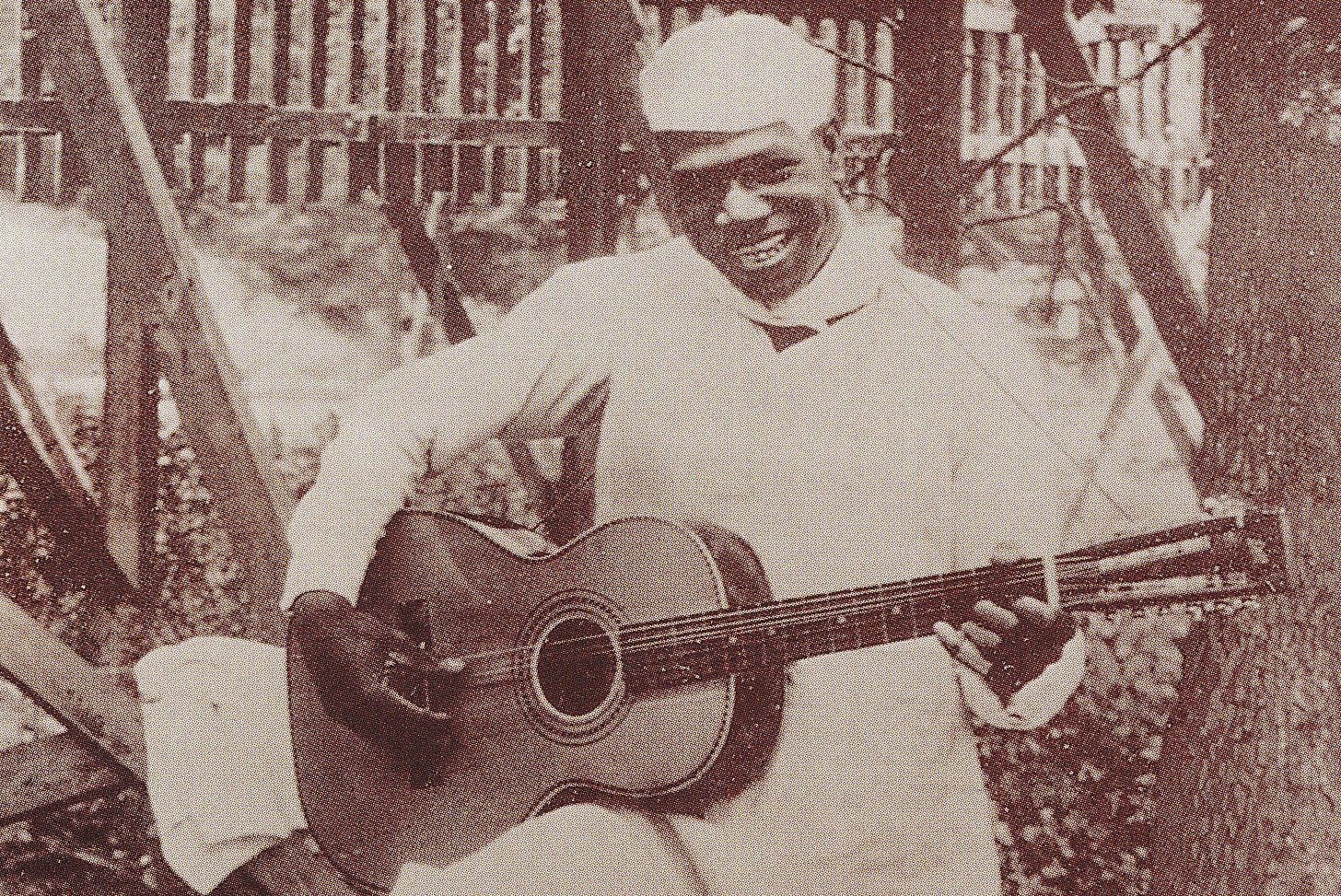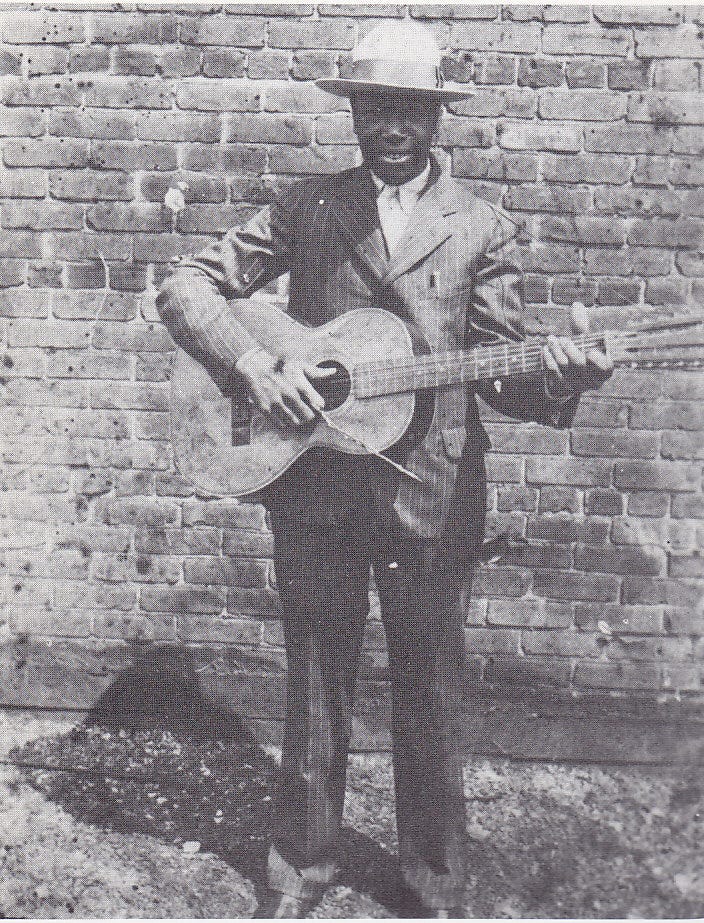Barbecue Bob's 12-String Georgia Blues
The Life and 78s of Robert Hicks, Columbia's Best-Selling 1920s Bluesman

During the Roaring Twenties, stacks of blues, gospel, and hillbilly 78s were recorded by travelling recording units manned by record company talent scouts and producer/engineers. OKeh Records was the first to make “race” records this way, recording Lucille Bogan and Fannie Goosby in Atlanta in 1923. Other labels soon adapted this strategy, and by the close of 1927 Columbia had successfully fielded mobile units in Atlanta, New Orleans, Dallas, and Memphis. Victor teams had visited Atlanta, New Orleans, Memphis, Charlotte, Savannah, and Bristol, Tennessee. Brunswick/Vocalion, meanwhile, had focused their recordings activities in St. Louis and Atlanta. Because of their efforts, classic recordings by Barbecue Bob, Blind Willie McTell, Lonnie Johnson, Peg Leg Howell, Victoria Spivey, Rev. J.M. Gates, Blind Willie Johnson, the Memphis Jug Band, and many others survive.
Columbia A&R man Frank B. Walker, veteran of many such trips, explained to Mike Seeger in 1962 that in the weeks before a field recording team’s arrival, the label would typically publish notices, often in newspapers, that they’d be in town: “We recorded in dozens and dozens of different places, all the way from San Antonio to Houston and Dallas and Johnson City, Tennessee, and Memphis and Little Rock and New Orleans and Atlanta and everywhere. But that’s the way we built it up in advance – getting the word around that at a certain time of the year we were going to be there. And these people would show up sometimes from eight or nine hundred miles away. How they got there I’ll never know, and how they got back I’ll never know. They never asked you for money. They didn’t question anything at all. They just were happy to sing and play, and we were happy to have them. Most of them we saw had something to go back with.”
During the 1920s Atlanta was an especially prime location for field recordings. Its thriving community of bluesmen had styles as distinctive as those of their counterparts in Mississippi, Memphis, and Chicago. Peg Leg Howell and His Gang specialized in countrified juke music set to guitar and violin. Billed as Barbecue Bob, Robert Hicks set his songs to percussive chording, zesty bass runs, and rhythmic slide played on a 12-string guitar. His older brother Charley was a less flashy 12-stringer whose dark personality belied the “laughing” shtick on his 78s. Their childhood friend Curley Weaver expertly played 6-string slide guitar as well as the old-time frailing and more recent “Piedmont” styles. Their associate Buddy Moss, a talented harmonica player and guitarist, drew from their sound, as well as what he’d picked up from records by Blind Blake and others. While his records didn’t sell as well as Barbecue Bob’s, Blind Willie McTell, truly in a class of his own, would emerge as one of the foremost bluesmen of any era.
The first major Atlanta blues artist to make 78s, Peg Leg Howell, began recording for Columbia in 1926. Like Lead Belly in Louisiana and old Henry Thomas in Texas, his repertoire extended to country reels, field hollers, ballads, and other pre-blues styles. While Peg Leg Howell and His Gang – guitarist Henry Williams and fiddler Eddie Anthony – tended to sound old fashioned, the Hicks brothers and Curley Weaver pushed Atlanta blues in new directions. The three had grown up together in the cottonfield country near the tiny settlement of Walnut Grove, Georgia. Robert, born on September 11, 1902, was a year-and-a-half younger than Charley, who’d be identified on record labels as “Laughing Charley” and “Charley Lincoln.” They were the sons of sharecroppers, as was their neighbor Curley James Weaver, four years younger than Robert. Curley’s mother, Savannah “Dip” Shepard, played guitar and piano in church. Old neighbors told researcher Pete Lowry that Dip taught the boys some guitar, showing them the frailing techniques and open-G tuning used by the area’s banjo players. They may have been introduced to slide guitar from unrecorded local guitarists Robert Lee Foster and George White, who were known to have tutored Weaver.
By 1918 the Hicks brothers were performing traditional songs such as “John Henry” and “Poor Boy” on 6-strings at fish fries and country balls. In the early 1960s, their sister told George Mitchell that Robert was the better guitarist, while Charley had a stronger voice. Around 1923 Charley moved to Atlanta, married, found work, and acquired a 12-string guitar with money he’d earned picking cotton. Robert followed him there about a year later. He worked various jobs – yardman, car hop, at the Biltmore Hotel – before becoming a pit chef at Tidwell’s Barbecue in Atlanta’s upscale Buckhead district. Columbia talent scout Dan Hornsby spotted him serenading patrons there, invited him to record, and suggested his “Barbecue Bob” stage name. To reinforce the image, Hornsby arranged to have the grinning Hicks photographed in chef’s apparel and holding a Stella Grand Concert model 12-string.
In a subsequent publicity photo, Hicks posed in a natty dark pinstripe suit, white tie and shirt, and fancy fedora. This photo reveals that Hicks put his Stella’s higher octave bass strings on top, like most 12-stringers today, and he may have used two unwound G strings. He tended to play bass runs with his thumb and used a bottleneck or ring for slide. He favored one- or two-chord song structures and was equally adept at fast, clean, highly rhythmic playing and slow blues. For added effect, he’d occasionally snap his lower strings or launch into solos at unexpected times. His 12-string guitar’s smaller-sized body enhanced the brightness of his sound, as did his banjo-derived technique of quickly strumming the strings with his picking hand’s full fingernails. He typically tuned to open G for slide and played in standard tuning as well, occasionally using a capo to play in higher keys.
Keep reading with a 7-day free trial
Subscribe to Talking Guitar ★ Jas Obrecht's Music Magazine to keep reading this post and get 7 days of free access to the full post archives.



